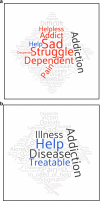Learning About and Destigmatizing Substance Use Disorders: a Video-Based Educational Module Using Simulated Patients
- PMID: 34751939
- PMCID: PMC8577171
- DOI: 10.1007/s40596-021-01559-z
Learning About and Destigmatizing Substance Use Disorders: a Video-Based Educational Module Using Simulated Patients
Abstract
Objective: The authors developed and tested video clips depicting three paradigmatic substance use disorder (SUD) clinical scenarios, each portrayed by a different simulated patient interacting with the same clinician.
Methods: The authors embedded 21 short video clips (with a cumulative duration of 27 min) into a 2-h session on SUDs. The didactic was delivered online through synchronous videoconferencing with Zoom. The primary outcome compared learners' scores on the Attitudes and Confidence in the Treatment of Patients with Substance Use Disorders (ACT-SUDS) before and after participating in the didactic.
Results: Fifty-eight second-year medical students participated and completed the survey prior to the didactic; 42 (72%) of them completed the survey immediately after. Compared to baseline, ACT-SUDS increased after the didactic: from 3.7 ± 0.5 to 4.0 ± 0.4 (mean difference = 0.4 [95% confidence interval = 0.2-0.5], paired-t = 5.75, p < 0.001), as did each of its four subscales: confidence, enjoyment, SUD as a medical disorder, and attitudes toward Alcoholics Anonymous (AA; t ≥ 3.0, p ≤ 0.005).
Conclusions: The video-based educational module proved easy to implement in the virtual classroom and led to measurable changes in perceptions and attitudes toward SUDs. The module is available to view or freely download and is amenable for adaptation by end-use instructors.
Keywords: Alcoholics/Narcotics Anonymous (AA/NA); Didactic; Simulated patients; Stigma; Substance use disorders (SUDs).
© 2021. Academic Psychiatry.
Conflict of interest statement
On behalf of all authors, the corresponding author states that there is no conflict of interest.
Figures
References
-
- McKance-Katz E National Survey on Drug Use and Health: detailed tables. Subst Abus Ment Heal Serv Adm [SAMHSA]. 2017;1–63. Available from: https://www.samhsa.gov/data/sites/default/files/reports/rpt31102/2019NSD... 2019 NSDUH.pdf. Accessed 6 Jun 2021.
-
- Saitz R, Horton NJ, Sullivan LM, Moskowitz MA, Samet JH. Addressing alcohol problems in primary care: a cluster randomized, controlled trial of a systems intervention. The screening and intervention in primary care (SIP) study. Ann Intern Med. 2003;138:372–382. doi: 10.7326/0003-4819-138-5-200303040-00006. - DOI - PubMed
MeSH terms
Grants and funding
LinkOut - more resources
Full Text Sources
Medical


